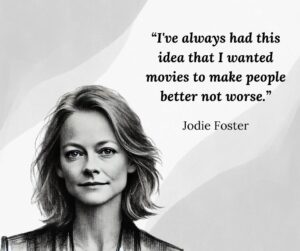Cinema is a powerful medium. It can entertain, provoke thought, and even change lives. Jodie Foster, an acclaimed actress, director, and producer, articulated a profound ethos when she said, “I've always had this idea that I wanted movies to make people better, not worse.” This statement encapsulates her belief that films can be more than just entertainment—they can serve as agents of positive change. In a world saturated with content, Foster’s approach to storytelling is a refreshing reminder of the responsibility artists hold and the potential impact of their work on audiences.
The Power of Storytelling in Cinema
From the earliest days of silent films to the modern era of blockbusters and streaming platforms, storytelling has been the heart of cinema. Stories shape how we see the world and ourselves. They reflect societal values, challenge norms, and inspire change.
Jodie Foster's career is a testament to this belief. With a legacy spanning decades, she has chosen projects that resonate with deeper truths, focusing on themes like justice, identity, resilience, and morality. Whether she's in front of the camera in roles like FBI trainee Clarice Starling in The Silence of the Lambs or behind the camera directing films like The Beaver and Money Monster, Foster prioritizes stories that engage audiences on a human level.
Her vision challenges the notion that films are merely escapism. While entertainment is a significant part of cinema, Foster’s philosophy suggests that films should also nurture empathy, provoke thought, and encourage personal growth. Stories that leave a lasting impression often compel viewers to reflect on their lives, beliefs, and the world around them.
Cinema as a Mirror and a Window
Movies have the unique ability to act as both mirrors and windows—mirrors that reflect our own experiences and emotions, and windows that offer a glimpse into lives and perspectives different from our own. Foster has been drawn to projects that balance these roles, using cinema as a tool to deepen understanding and connection.
Consider her portrayal of Sarah Tobias in The Accused (1988). The film, based on a true story, addresses the harrowing issue of sexual assault and the challenges victims face in seeking justice. Foster’s raw and vulnerable performance earned her an Academy Award and sparked crucial conversations about consent and accountability. This wasn’t just entertainment; it was a cultural touchpoint that forced audiences to confront uncomfortable realities.
Similarly, her directorial work in Home for the Holidays (1995) explores the complexities of family relationships. The film, though comedic and lighthearted at times, delves into themes of acceptance, forgiveness, and belonging. Foster’s ability to weave humor with heartfelt moments showcases her commitment to creating films that are both engaging and meaningful.
Navigating Responsibility in Art
The idea of making people “better” through movies carries a sense of responsibility. Filmmakers wield significant influence, as their work shapes cultural narratives and societal values. Foster’s quote implies that this influence should be used consciously and ethically.
However, the line between creating art that inspires and art that panders can be thin. Foster's films do not preach; instead, they pose questions and invite audiences to think critically. This approach respects the intelligence of viewers while guiding them toward introspection.
In a 2013 interview, Foster expressed her belief in the collaborative nature of filmmaking, emphasizing the importance of authentic voices. She stated, “Every movie is an opportunity to learn, to better yourself, and to challenge what you thought you knew.” This aligns with her idea of cinema as a medium for personal and collective growth.
Foster’s Role as a Director and Advocate
Jodie Foster’s directorial ventures reveal her commitment to her vision. She gravitates toward stories that explore the human condition, offering nuanced portrayals of struggles and triumphs. For instance, in Little Man Tate (1991), Foster directs a tender story about a child prodigy navigating the pressures of his extraordinary intellect while yearning for a normal childhood. The film examines themes of identity, isolation, and parental love, resonating with anyone who has ever felt “different.”
As a director, Foster also champions diversity and inclusivity in storytelling. She has advocated for more women in leadership roles within the film industry, recognizing that diverse perspectives enrich the narratives we see on screen. Her commitment to making cinema a force for good extends beyond the themes of her films to the industry itself.
Cinema’s Role in a Changing World
In today’s digital age, audiences are inundated with content. Social media, streaming platforms, and 24/7 news cycles often blur the lines between reality and fiction, leaving people vulnerable to misinformation and desensitization. Foster’s philosophy reminds us of the importance of intentional storytelling.
Films have the potential to counteract the negative influences of sensationalism and cynicism. They can provide solace in difficult times, offer a sense of hope, and inspire action. For instance, movies like Erin Brockovich and 12 Angry Men have demonstrated how storytelling can motivate real-world change, encouraging audiences to question systems of power and take a stand for justice.
Foster’s own work aligns with this legacy of impactful cinema. Her belief that movies can make people “better” challenges filmmakers to think critically about the stories they choose to tell and the messages they convey.
The Balance Between Art and Commerce
One of the challenges filmmakers face is balancing artistic vision with commercial success. The film industry is a business, and box office performance often dictates what stories get told. Foster’s career is a testament to navigating this delicate balance. She has worked on commercially successful films while maintaining her artistic integrity, proving that meaningful storytelling can also resonate with broad audiences.
For example, The Silence of the Lambs was both a critical and commercial success, grossing over $270 million worldwide and winning five Academy Awards. The film’s exploration of morality, power dynamics, and psychological complexity elevated it beyond the typical thriller, leaving a lasting cultural impact.
Inspiring Future Generations
Jodie Foster’s message is especially relevant for aspiring filmmakers and audiences alike. For creators, her philosophy serves as a reminder to approach their craft with purpose and authenticity. For viewers, it encourages a more mindful consumption of media, urging them to seek out stories that challenge and inspire.
Her vision underscores the idea that art, at its best, is a reflection of humanity’s potential for growth and goodness. Movies that make people “better” contribute to a culture of empathy, understanding, and hope—values that are especially vital in an increasingly divided world.
In Conclusion
Jodie Foster’s belief in cinema as a force for good is a powerful call to action for filmmakers, audiences, and the industry as a whole. By striving to make movies that “make people better, not worse,” she sets a standard for storytelling that prioritizes humanity, empathy, and integrity.
Her career exemplifies the transformative potential of film, proving that stories have the power to not only entertain but also enlighten and uplift. In an era where media often prioritizes profit over purpose, Foster’s message reminds us of the profound impact of intentional, meaningful storytelling. Her vision invites all of us—whether as creators or consumers—to use the power of cinema to foster a better, more compassionate world.


















